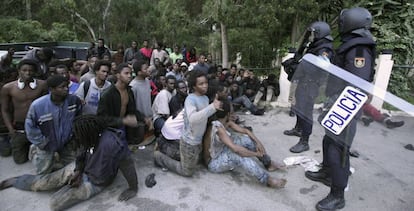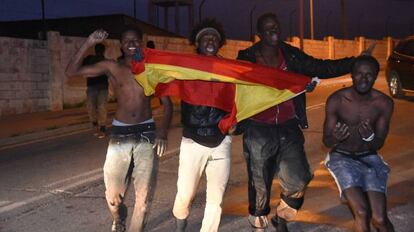Can Ceuta teach Brexit Britain lessons about “taking back control?”
The briefest of glances at Spain would have debunked the myth that the European Union is unequivocally pro-immigration and unwilling to keep member states’ borders in check
“Take back control” is widely held to be the slogan that won the UK’s referendum on EU membership last year, and sent Britain charging toward the exit door. Formal negotiations have now begun, and there is one thing Britain is keen to get its hands on more than anything else: control of immigration. With those three vague yet evocative words, campaigners helped to create the perception of a naive EU, unequivocally pro-immigration and unwilling to keep member states’ borders in check.

The briefest of glances to Spain would have debunked this myth. In its Moroccan enclaves of Ceuta and Melilla, “control” means massive barbed-wire fences, diplomatic tensions and misery for the increasing numbers of migrants who seek a better life in Europe. Backed and funded by the EU, these fortress territories demonstrate clearly that the bloc knows what taking back control looks like – and it’s not pretty.
In Ceuta, migrants in limbo describe the place as a “mental prison”
In Ceuta, migrants in limbo describe the place as a “mental prison.” Often basically penniless, they live in increasingly crowded temporary accommodation while they wait to find out whether they can stay in Europe or if their arduous journeys from sub-Saharan Africa have been totally in vain.
Yet these are the lucky ones: they’ve managed to scale the dangerous six-meter-high fence. They’ve also survived the months of brutal Moroccan police tactics in the forest a stone’s throw from their destination, waiting for an opportunity to make a break for a better life.
Samyong Hilaire left Cameroon last summer, and spent the winter in woods on the Moroccan side of the frontier. The 23-year-old was one of hundreds of migrants to finally make it to Ceuta in one of the greatest single influxes in recent times back in February.

He said: “In the forest we lived with many brothers among the trees. It’s not easy to live there, because we spent a lot of time without toilets, and we ate just once a day at 11am. Every day Moroccan police came to move us on. We hid on the top of the hills and in the rocks. It’s very difficult living in the forest. But we had a dream, we knew what we were searching for, and that’s why we lived like this, sleeping outside during the winter.”
Ulrich Cabrel, 21, arrived on the same day – after climbing the fence in the dead of night in his second attempt to reach Ceuta.
We had a dream, and that’s why we lived like this, sleeping outside during the winter
Samyong Hilaire, 23, from Cameroon
“The conditions in the forest are very difficult,” he said. “There’s no food, and often the Moroccan Auxiliary Forces enter the forest and set fire to your belongings and the small tents we slept in. In Cameroon, I have a baccalaureate qualification but my parents didn’t have the money for me to continue my education. In sub-Saharan Africa, if you don’t know someone who works for the government, you can’t get a job. If your auntie, or your father, or someone in your family doesn’t have a good job, it’s impossible. Ceuta is a mental prison. Here, you can’t work, you just eat and sleep. It’s exhausting.”
After making it to Ceuta, both Ulrich and Samyong went straight for the city’s temporary stay center for immigrants, known by the acronym CETI. They are among hundreds living there. But the center, with a capacity of 500, is rammed. Last year saw the number of migrants entering Ceuta rise 14% to 2,578, placing a strain on the enclave’s limited resources. Since Christmas, more than a thousand others are believed to have arrived.
Some speculate that recently heightened security in Spain’s other Moroccan enclave of Melilla could be a factor in this change. The coastal city, some 380 kilometers east of Ceuta, has historically been more of a flashpoint on the migrant trail, but the route appears to be shifting.
Spain and the EU lean on Morocco to provide security at the border, often using fairly brutal methods
Another possible reason is Morocco – which Spain and the EU lean on to provide security at the border – often using fairly brutal methods. Observers say these include the rounding up of migrants before dumping them in the middle of the desert and telling them to be on their way. Ulrich’s story suggests this is no myth. He eventually made it into Ceuta, but says during one earlier failed attempt he was captured by Moroccan security forces and taken “far away” from the forest before having to make his way back again.
The Moroccans use this unsavory role as a bargaining chip in negotiations with Europe, and the country’s government is often said to relax or ramp up security efforts in accordance with political expediency. The EU plays this grubby game, where hundreds of human lives are currency in a diplomatic tug-of-war.
Spain is not Britain, but Ceuta represents something that’s conspicuously absent from debate about the EU in the UK. The notion of control may win referendum votes, but it may also mean walled frontiers, human suffering and disconcerting diplomacy. On immigration, the EU is far from the shrinking violet some would have people believe.
Tu suscripción se está usando en otro dispositivo
¿Quieres añadir otro usuario a tu suscripción?
Si continúas leyendo en este dispositivo, no se podrá leer en el otro.
FlechaTu suscripción se está usando en otro dispositivo y solo puedes acceder a EL PAÍS desde un dispositivo a la vez.
Si quieres compartir tu cuenta, cambia tu suscripción a la modalidad Premium, así podrás añadir otro usuario. Cada uno accederá con su propia cuenta de email, lo que os permitirá personalizar vuestra experiencia en EL PAÍS.
¿Tienes una suscripción de empresa? Accede aquí para contratar más cuentas.
En el caso de no saber quién está usando tu cuenta, te recomendamos cambiar tu contraseña aquí.
Si decides continuar compartiendo tu cuenta, este mensaje se mostrará en tu dispositivo y en el de la otra persona que está usando tu cuenta de forma indefinida, afectando a tu experiencia de lectura. Puedes consultar aquí los términos y condiciones de la suscripción digital.








































